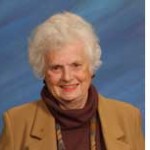By Natasha Josefowitz, Ph.D.

LA JOLLA, California — It is interesting that while living in Paris, my parents resisted any French influence and continued their Russian way of life: eating Russian food, reading Russian newspapers and books, having Russian friends, and speaking Russian at home. My first tongue was Russian. In the U.S., they did the same thing—continued the Russian traditions they had grown up with.
While my brother and I were eager to become more American, our parents wanted us to stay traditional. That meant we children were to have good manners: be polite, quiet, not speak until spoken to, stand up when an adult walked into the room, bring chairs up, offer food, and recite Russian poetry to entertain guests. I was also often asked to exhibit Russian dances at parties.
Slowly my family started meeting other Russian immigrants, and we became part of an enclave of White Russians retaining our Russian culture in the midst of Beverly Hills. Because we had two families living together, the gatherings were mostly at our house. As more and more Russian immigrants arrived in Beverly Hills, our gatherings became known.
The two families living together presented some problems. My mother was in charge of the household one week, and my aunt the next. After a few months of this, guests would ask to whose week they were invited, preferring my mother’s week because the food was better. This upset my aunt and caused a lot of friction in the household, and so the two women changed the arrangement so that my mother was in charge of the inside of the house and my aunt the outside—the garden and the pool. That worked better.
The “Million Dollar Trio”: Lithuanian violinist Jascha Heifetz, Polish pianist Artur Rubenstein, and Russian cellist Gregor Piatigorsky, were often at our dinners, playing trios in our living room. My mother always had a party for them after a concert. Artur, in particular, would not come down from the high of performing. We played charades, and finally, at around 3 a.m., my mother would send him and his wife Nela home.
Frances and Jascha Heifetz became weekly regulars at our house. Jascha always ordered ahead of time what he wanted on the menu. They had a beach house in Santa Monica, and we used to go there weekends and play ping pong, his favorite game. He was a strange man, liking to play jokes, for instance, he had some pants made with one navy leg and one black leg to see if anyone noticed and said anything. I once said to him after a concert, “You played like a god.” And he said, “Where did you last hear God play?” I am still in touch with their son Jay Heifetz, a photographer in Australia.
Gregor Piatigorsky, known as Grisha, was married to Jacqueline de Rothschild, who became an accomplished tennis and chess player, author, sculptor, philanthropist, and arts patron. When her mother, the Baroness Germaine de Rothschild, came to visit, she often went out to lunch with my mother. Her favorite place to eat was at a drug store counter; she would order a sandwich and an ice cream soda. Sol Hurok, the impresario, would come to our dinners with his whole Russian Ballet company. Danny Kaye, who always wore that funny, crumpled hat even indoors, cooked Chinese dinners for us. He invited us once to his box at the Hollywood Bowl with Jerusalem Mayor Teddy Kollek.
We had poolside parties where Russian opera singer Feodor Chaliapin’s sons Boris (an artist) and Feodor, Jr. (a film actor) cooked shish kebabs on our brick barbecue. One evening, Prince Vladimir Rachevsky, another regular, said that if our glasses were real Baccarat, they would not break if thrown in the pool. So everyone drank toasts and threw them in the pool. They were real, and he was wrong. The next morning my mother’s complete set of long-stemmed champagne glasses was lying in pieces at the bottom.
After the war ended, Russian musicians would come to the U.S. on concert tours. Pianists Sviatoslav Richter and Emil Gilels were frequent visitors, bringing with them bowls of fresh caviar which my mother served with small pancakes and sour cream. I can still sing the popular Russian songs of that generation and did so, surprising the Russian conductor Valery Gergiev when he came here a couple of years ago to conduct our San Diego Symphony as guest conductor.
(c) Natasha Josefowitz. This article appeared initially in the La Jolla Village News. You may comment to natasha.josefowitz@sdjewishworld.com
Wow! What an amazing way to grow up. I am drooling and green with envy. — Dorothea Shefer-Vanson, Mevasseret Zion, Israel